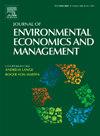极端气温对驱逐的影响
IF 5.5
3区 经济学
Q1 BUSINESS
Journal of Environmental Economics and Management
Pub Date : 2024-09-20
DOI:10.1016/j.jeem.2024.103055
引用次数: 0
摘要
利用美国的驱逐数据,我们估算了气温与驱逐申请之间的关系。我们发现,极端高温天会导致申请驱逐的数量在统计上显著增加,而极端寒冷天则没有这种关系。为了解释这些发现,我们表明住宅能源支出对极端高温比极端寒冷更敏感,而且美国的能源援助计划优先资助供暖而不是制冷。这些研究结果表明,与现在相比,在未来气候变化的情况下,如果没有其他政策或私人适应措施,炎热天数增加而寒冷天数减少将增加驱逐申请。本文章由计算机程序翻译,如有差异,请以英文原文为准。
The effect of extreme temperatures on evictions
Using data on evictions in the United States, we estimate the relationship between temperature and eviction filings. We find that extreme heat days result in a statistically significant increase in filings, while extreme cold days do not have the same relationship. To explain these findings, we show that residential energy expenditures are more sensitive to extreme heat than extreme cold, and that energy assistance programs in the United States prioritize funding for heating rather than cooling. These findings suggest that relative to today, future climate change scenarios with more hot days and fewer cold days will increase eviction filings without other policy or private adaptation.
求助全文
通过发布文献求助,成功后即可免费获取论文全文。
去求助
来源期刊
CiteScore
8.00
自引率
4.30%
发文量
91
期刊介绍:
The Journal of Environmental Economics and Management publishes theoretical and empirical papers devoted to specific natural resources and environmental issues. For consideration, papers should (1) contain a substantial element embodying the linkage between economic systems and environmental and natural resources systems or (2) be of substantial importance in understanding the management and/or social control of the economy in its relations with the natural environment. Although the general orientation of the journal is toward economics, interdisciplinary papers by researchers in other fields of interest to resource and environmental economists will be welcomed.

 求助内容:
求助内容: 应助结果提醒方式:
应助结果提醒方式:


